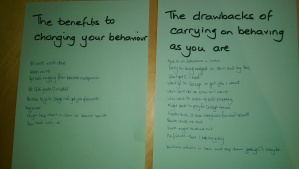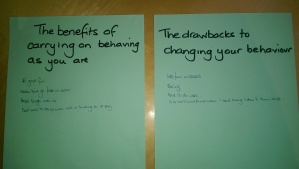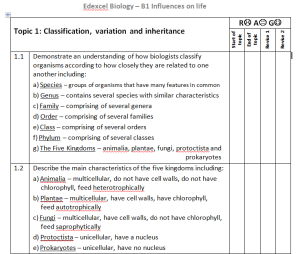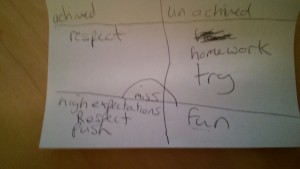Year 9 Middle ability boys who spent a lot of time being sent out of science class to Isolation.
Brief report:
Target group of 14 boys identified as underachieving in relation to their target grades: Student A attended two sessions overall and found it difficult to cope with being out of his normal class. Most students had between 7 and 9 sessions overall prior to their Y9 exam.
The first class began with the students thinking about what they wanted to achieve and what they could do in class to help their journey. This was done by asking questions to them as individuals and asking for their response as individuals written down and collected in. The questions were based around those used in the cycle of change developed by DiClemente and Prochaska (http://socialworkpodcast.blogspot.com/2009/10/prochaska-and-diclementes-stages-of.html.)
Surprisingly the students all expressed a desire to improve their grades and also identified their own behaviour as being a barrier to achievement. Several felt that in class if they did not understand a concept it was easier to act the fool than to admit they did not understand. A lot of their concerns were about losing face in front of the class. Isolation was easier than having to think hard.
Most seemed to enjoy the small group sessions; with the exception of Student A who found it difficult to work in this way. During practical or kinaesthetic activities the boys were more likely to begin to ask questions about why things happened and were keen to show off their extended knowledge in areas. They particularly liked practicals such as adding acid to metals and then testing for oxygen and hydrogen. Small video clips such as Felix Baumgartner falling to earth worked well also and aided discussion along scientific concepts.
The students liked being able to question others and use the white board. We did this when doing speed calculations etc. They set each other questions to do etc.
It was difficult to plan practicals and conduct them in classrooms so in future it would be good to ensure that lab space was available for these sessions.
The classes the students came out of were all on different topics. It would have been really useful to ensure that this was the same or limited to two different areas. I used to split the class into two sections and we all did topic one for half an hour and then the plan was to move onto topic two. However sometimes we were so engrossed in topic one that we didn’t have time for topic two. This may have meant some students were less well prepared to go back into their taught class. In the group were there were students from 3 classes this was not possible. However students reported that it helped them when they did do the topic in the future or helped with remembering things from that topic.
The group size varied from 7 to 2. The optimum group size in my opinion was five. This enabled me to really ensure that each student understood the concept well and could answer questions in detail. I made each student answer me in full sentences and avoid the word it or thing.
I felt that the students did well, worked well and it would be worthwhile continuing in the future perhaps even identifying the cohort from the end of Year 8.
I think it important to keep the group single gender even though it perhaps goes against equal opps. The camaraderie and the focus of lessons was focused on the way boys like to learn and enabled them to admit to not understanding concepts well in a way that they might not if girls were present.
Results: (This was pre new spec and when we still did SATs in Y9)
Three boys stayed at the same attainment level. One boy went down a full level. Five boys increased by an attainment level and five increased by two attainment grades. This represented an increase of 14 levels for the group as opposed to three levels across the group from October to the end of January.






![IMAG0689[1]](https://teachercoach1.files.wordpress.com/2014/09/imag06891.jpg?w=461&h=261)
![IMAG0691[1]](https://teachercoach1.files.wordpress.com/2014/09/imag06911.jpg?w=499&h=283)
![IMAG0694[1]](https://teachercoach1.files.wordpress.com/2014/09/imag06941.jpg?w=436&h=247)


![IMAG0652[1]](https://teachercoach1.files.wordpress.com/2014/09/imag06521-e1409691461110.jpg?w=169&h=300)
![IMAG0650[1]](https://teachercoach1.files.wordpress.com/2014/09/imag06501-e1409691668212.jpg?w=169&h=300)
![IMAG0659[1]](https://teachercoach1.files.wordpress.com/2014/09/imag06591.jpg?w=318&h=184)
![IMAG0655[1]](https://teachercoach1.files.wordpress.com/2014/09/imag06551.jpg?w=169&h=300)
![IMAG0668[1]](https://teachercoach1.files.wordpress.com/2014/09/imag06681-e1409695065726.jpg?w=300&h=169)
![IMAG0674[1]](https://teachercoach1.files.wordpress.com/2014/09/imag06741-e1409695345188.jpg?w=300&h=169)

You must be logged in to post a comment.